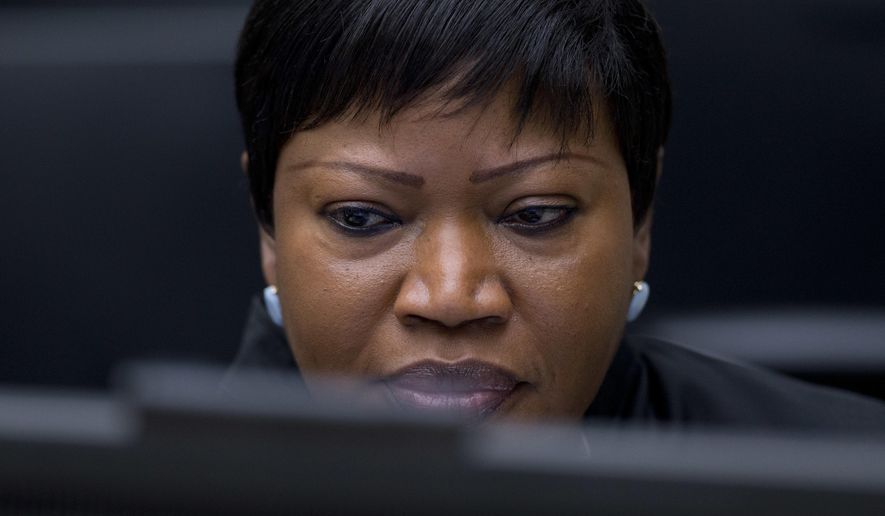OPINION:
The International Criminal Court has closed its doors but only temporarily. When the coronavirus pandemic subsides, the ICC will be back in business. And a bad business it is.
If you’re not familiar with the ICC, let me enlighten you: It began life 18 years ago, established by the Rome Statute, a multilateral treaty. Its promoters promised it would be a court of last resort, bringing to justice perpetrators of such heinous crimes as genocide. Skeptics predicted it would become another expensive international bureaucracy, usurping power, accountable to no democratic entity.
A fundamental principle of international law: A treaty binds only those parties that consent to it. The United States did not ratify the Rome Statute. Therefore the United States is not bound by the Rome Statute, and is not subject to the ICC.
The U.S. government has repeatedly emphasized this point. One example: “The United States respects the decision of those nations that have chosen to join the ICC, and in turn, we expect that our decision not to join and not to place our citizens under the court’s jurisdiction will also be respected.”
Fatou Bensouda, the chief prosecutor for the ICC, has told the United States to shove its expectations. In 2017, she announced her intention to investigate alleged war crimes and crimes against humanity committed by U.S. military personnel in Afghanistan. This month, after drawn-out deliberations, the ICC announced that the investigation would go forward.
A few words about Ms. Bensouda: In the 1990s, she was the legal adviser to Gambian dictator Yayah Jammeh. A junior military officer who took power in a coup, he soon garnered a reputation as a brutal abuser of human rights who helped himself to millions of dollars from government coffers. Ms. Bensouda later became the country’s minister of justice. Today, according to Freedom House, the tiny African country’s judiciary “is hampered by corruption and inefficiency,” and its constitutional “guarantees of due process remain poorly upheld.”
I’ll be blunt: What we’re witnessing here is globalism gone wild.
Do not confuse globalism with globalization. The latter implies a process of increasing interdependence, for better or worse. Globalism, by contrast, is an ideology. Globalists, also known as transnational progressives, are establishing institutions of supranational governance to which they demand Americans surrender sovereignty.
Ms. Bensouda is bringing a case against another nation that has declined to join the ICC. Did you guess? She’s targeting Israelis fighting the Hamas terrorists who took over Gaza after Israel’s withdrawal from that territory.
Also pertinent: Under the Rome Statute, the ICC is only to investigate nations “unable or unwilling” to fairly prosecute wrongdoing on their own. The United States and Israel have among the most credible judicial systems in the world. So why doesn’t that rule them out? Because the ICC says so. You got a problem with that? Tell it to the judge.
Over its almost two decades of existence, the ICC has spent billions of dollars and achieved less than a dozen convictions. Most of those indicted have been African despots.
You won’t be surprised to learn that there have been no investigations regarding Russia or China (not among the ICC’s 123 members), nor any involving Syria and the Islamic Republic of Iran (which have signed but not ratified the Rome Treaty).
Secretary of State Mike Pompeo recently called the ICC “an unaccountable political institution, masquerading as a legal body.” He vowed to “take all necessary measures to protect our citizens from this renegade, so-called court.”
The ICC, he added, has now “stumbled into a sorry affirmation of every denunciation made by its harshest critics over the past three decades.” As an initial response, he said, ICC prosecutors and judges involved in the investigations of American forces may not be permitted to enter the United States. The same restriction may be applied to their families.
Mr. Pompeo added: “These visa restrictions will not be the end of our efforts. We’re prepared to take additional steps, including economic sanctions, if the ICC does not change its course.”
Globalists went ballistic. Human Rights Watch called Mr. Pompeo’s statement “a thuggish attempt to penalize investigators.” Amnesty International called it a “threat” and “a new low, even for this administration.”
Think about that. To come to America is a privilege, not a right. To access America’s financial system is a privilege, not a right. By what logic does the denial of privileges constitute a penalty or threat?
The Quincy Institute chimed in, too. This new, non-governmental organization springs from the minds and wallets of George Soros, a globalist of the left, and Charles Koch, a pillar of the libertarian right.
Sarah Leah Whitson, a Quincy executive, railed against Mr. Pompeo’s response, calling it “unlawful collective punishment.”
I’m sure Ms. Bensouda agrees as, I’d guess, does Mr. Soros. But is it possible that Mr. Koch would not object to American soldiers being arrested and incarcerated in European countries that American forces protect and defend? Would he not be appalled to see them put on trial by foreign prosecutors lacking both jurisdiction and legitimate authority?
Dear Reader, if you happen to be in touch with Mr. Koch, or know someone who is, would you please bring this column to his attention? It would be a pity if, while he was focused on the pandemic or the economy or something, his money was being spent to promote values contrary to his own.
On the other hand, if this uber-wealthy philanthropist is now in harmony with the globalist, blame-America-first chorus, that would be bad news at time when bad news is hardly in short supply.
• Clifford D. May is founder and president of the Foundation for Defense of Democracies (FDD) and a columnist for the Washington Times.




Please read our comment policy before commenting.